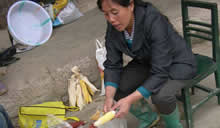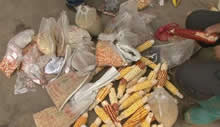By Cynthia Wong
 “This is what everyone called small yellow corn! I have never seen this (traditional) variety before, but why do the other farming households (now) grow hybrid corns? We should conserve the small yellow corn. It is highly nutritious and is adapted to our climate and soil, and the yield is high too. It can also be made into wine. The older generations used to eat them……” Luo Xiuqiong is a Bu-yi farmer in the Wayao Village of Baiyun District in Guizhou. She said that when she was small, her mother had the practise of saving seeds of traditional crop varieties because they were easy to grow and there was no need for a lot of fertilizer. These traditional varieties are lost and Luo Xiuqiong does not know the reasons behind.
“This is what everyone called small yellow corn! I have never seen this (traditional) variety before, but why do the other farming households (now) grow hybrid corns? We should conserve the small yellow corn. It is highly nutritious and is adapted to our climate and soil, and the yield is high too. It can also be made into wine. The older generations used to eat them……” Luo Xiuqiong is a Bu-yi farmer in the Wayao Village of Baiyun District in Guizhou. She said that when she was small, her mother had the practise of saving seeds of traditional crop varieties because they were easy to grow and there was no need for a lot of fertilizer. These traditional varieties are lost and Luo Xiuqiong does not know the reasons behind.
Stories about Traditional Seeds
Luo has collected the seeds of nearly 40 traditional varieties. Pick up any one bag of these seeds and she could tell you in detail where she got them as well as the history and story associated with the crop. Take the small yellow crop mentioned earlier as an example, she said: “In the Luo’s family we had a great grandfather. He worked for a landlord as a farm helper feeding pigs. In the fields of the landlord, many of this corn were grown. Many people said to him: ‘You won’t be able to grow the kind of crop the landlord grows.’ In one year, it was about this time of the year, that is, the time for sowing. Our great grandfather thought of a way. He put on his wellington boots when he went to the landlord’s home and put some seeds into his shoes so that he could grow them at home. In the year he brought back the seeds, he only grew them on his own land because the quantity of the seeds was limit. The following year he shared the seeds with other farmers so they could grow them as well. Hence, we could say this was a crop variety they developed together.”
Preserving Dignity by Conserving Traditional Seeds
Speaking of seed saving, the attitude of Luo Xiuqiong is firm: “we must keep saving traditional seeds because they could be grown without using any chemical fertilizer. They are better than hybrid corns which require a lot of chemical fertilizer and labour to grow. We have experimented with the corns. If you feed the ducks with small yellow corn, they would lay eggs in normal way. If you feed them with hybrid corns for over a week, they would not be laying eggs as usual…..” Luo Xiuqiong used simple examples from the everyday life of farmers to illustrate the importance of ecological agriculture – all things in nature are connected, human beings would suffer the consequence if they violate the law of nature. “Whether it was for cooking or for brewing wine, the taste and the quality of small yellow corn are better than the other varieties. Now I can grow the varieties I want to eat because I have most of the varieties. Even in the market, the quality of small yellow corn is considered better than other corns. Hybrid corns cost one yuan, and small yellow corn costs one yuan fifty cents.” The confidence emerges from her word and in the eyes of Luo Xiuqiong seems to say that conserving traditional crop varieties can preserve the dignity of farmers.
As one of the facilitators, Luo Xiuqiong is known as “Community Facilitator” (CF) in PCD because PCD believes that apart from partner organizations, the participation of local farmers and their conscious effort to unearth and to preserve the wisdom and experience of traditional farming culture is most important. As a farmer-community facilitator, Luo’s work in preserving traditional crop varieties has a double meaning. First, by collecting seeds of traditional varieties that her ancestors had selected over hundreds of years based on the stability of their yield and their adaptability to local ecological environment, she was passing on tangible objects. Second, just like her ancestors, she has also been growing the crops herself and has been sharing her experience with other villagers. In this way, she is also passing on the culture and knowledge of her ancestors.
Since 2005, PCD has been working with the Institute of Biotechnology Research from the Guizhou Academy of Agricultural Sciences on ecological agriculture projects. Luo is one of the farmers who have shown keen interest in conserving traditional varieties. By 2008, she had already collected 36 traditional local varieties and in 2009 she found 3 more varieties. Now she no longer uses any chemical fertilizer or pesticide in farming.
More information:
About the mechanism of “Community facilitator ”, please read P.86 of In the Field which can be downloaded from http://www.pcd.org.hk/download/GreenBook_low.pdf




